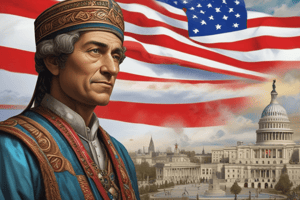Podcast
Questions and Answers
What is the role of a representative in a representative democracy?
What is the role of a representative in a representative democracy?
- To lobby for special interest groups
- To advocate for personal interests
- To make laws on behalf of the electorate (correct)
- To petition against injustices
What is an association, and why are they important?
What is an association, and why are they important?
- A group of people who share common interests, important for personal gain
- A group of people who share common interests, important for business networking
- A group of people who share common interests, important for influencing public policy (correct)
- A group of people who share common interests, important for social gatherings
What is one way an individual can participate in government?
What is one way an individual can participate in government?
- By voting in elections
- By attending public meetings
- By writing a letter to the editor
- By all of the above (correct)
What is an injustice, and what can be done to address it?
What is an injustice, and what can be done to address it?
How many zones or regions does ACFA have?
How many zones or regions does ACFA have?
How many representatives does ACFA have?
How many representatives does ACFA have?
What is the primary purpose of a lobbyist, and how do they contribute to the decision-making process in a representative democracy?
What is the primary purpose of a lobbyist, and how do they contribute to the decision-making process in a representative democracy?
Describe a scenario in which an individual would utilize a petition as a means of advocating for change, and explain the potential impact of this action.
Describe a scenario in which an individual would utilize a petition as a means of advocating for change, and explain the potential impact of this action.
What is the significance of accountability in a representative democracy, and how does it relate to the concept of implementation?
What is the significance of accountability in a representative democracy, and how does it relate to the concept of implementation?
Explain the concept of an electorate and its significance in a representative democracy, providing an example of how it functions in practice.
Explain the concept of an electorate and its significance in a representative democracy, providing an example of how it functions in practice.
Compare and contrast the roles of an advocate and a lobbyist, highlighting their similarities and differences in a representative democracy.
Compare and contrast the roles of an advocate and a lobbyist, highlighting their similarities and differences in a representative democracy.
Describe a scenario in which an individual might participate in a public meeting, and explain the potential impact of their involvement.
Describe a scenario in which an individual might participate in a public meeting, and explain the potential impact of their involvement.
Flashcards are hidden until you start studying
Study Notes
Vocabulary
- ACFA: organization with 14 regional offices, 13 representatives, 1 president, 4 members, and 6 zones/regions
- MNA: organization with regions (need to study map for details)
- Metis: term related to a specific group or community
- Representative Democracy: system of government where elected representatives make decisions on behalf of citizens
- Lobbyist: person who advocates for a particular interest or group
- Public Meeting: gathering of citizens to discuss issues
- Accountable: responsible and answerable for actions
- Candidate: person running for office
- Association: group of people with shared interests or goals; important for collective action and decision-making
- Electorate: all citizens eligible to vote in an election
- Implementation: process of putting a plan or policy into action
- Injustice: situation where individuals or groups are treated unfairly
- Advocate: person who supports or speaks out for a particular cause
- Petition: formal request signed by many people to advocate for a cause
- Rally: gathering of people to show support or protest an issue
Roles and Responsibilities
- Representative: elected official who represents citizens in government; responsible for making decisions on their behalf
- Responsibilities include:
- Representing citizens' interests
- Making decisions on their behalf
- Being accountable to citizens
- Responsibilities include:
Participation in Government
- Ways to be an active participant in government:
- Voting
- Contacting representatives
- Attending public meetings
- Joining associations or advocacy groups
- Signing petitions
- Participating in rallies
- Methods of participation (page 194):
- Need to have a general understanding of each method
- Can describe one method in detail
Studying That Suits You
Use AI to generate personalized quizzes and flashcards to suit your learning preferences.




